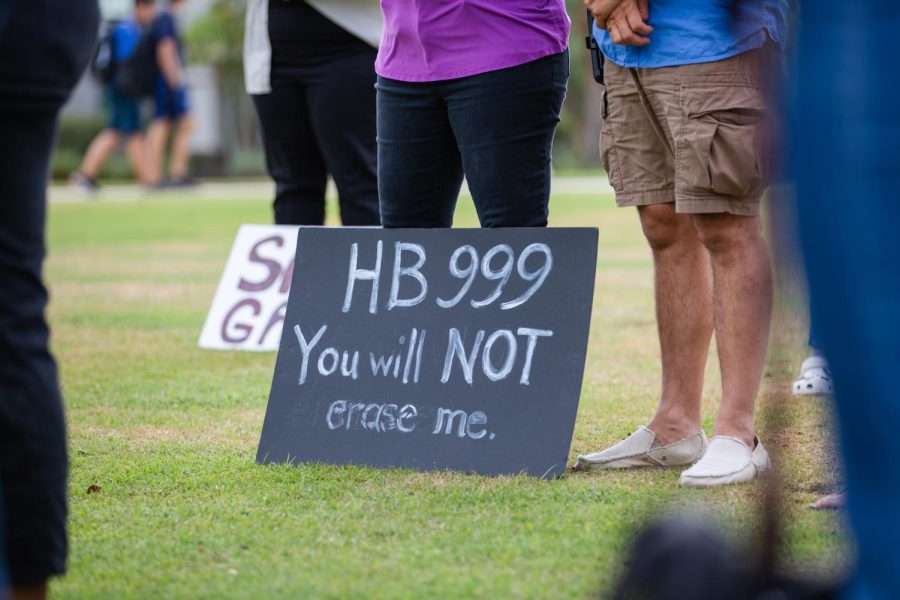Florida House Bill 999: What It is, What It Isn’t, and Its Potential Impact at FGCU
A sign that was held by a protester during the “Take a Stand Against HB999” protest that took place on the library lawn Monday April 10, 2023. Students and faculty took turns speaking out against the bill and explaining its repercussions.
May 8, 2023
This story was written before the the amendments were made to the bill and reflects the initial public reaction.
Florida House Bill 999—Postsecondary Educational Institutions (HB 999)— is a controversial article of pending legislation in the Florida House of Representatives that has the potential to impact every public education institution in the state.
If passed, the bill would prohibit the expenditure of university funds on campus offices or student organizations that promote diversity, equity, and inclusion (DEI), give hiring authority to each Florida public university’s governor-appointed Board of Trustees, and ban majors deemed by lawmakers as “woke.”
The bill would institute a system of review for tenured professors– a system that FGCU does not utilize.
HB 999 is endorsed by Governor Ron DeSantis, whose office released a statement saying the bill is necessary to push back against “the tactics of liberal elites who suppress free thought in the name of identity politics and indoctrination.”
Although the wording of the bill leaves its full impact difficult to gauge, student leaders and faculty alike are concerned by the potential ramifications of the bill– with faculty primarily focusing on the proposed hiring authority of the Board of Trustees and student leaders worried about potential lack of funding for DEI-focused organizations on campus.
It is unclear in the wording of HB 999 how far the Board of Trustees’ power to hire would go, or what specific positions it would hire for. However, Dr. Landon Frim, an FGCU professor in the programs of philosophy and religious studies, believes that the proposed changes in hiring practices would lead to long term problems for the Florida State University System.
“It’s simply worsening the quality of higher education in Florida,” Frim said. “We’ll experience a serious brain drain, not just students but faculty draining out of Florida.”
Several student leaders find issues with HB 999’s proposed prohibition of student funds to campus offices or student organizations that promote diversity, equity and inclusion.
Andrea Toles, the president of the Black Student Alliance, says that the organization she runs may not be able to survive HB 999 intact.
“I’ll try my best to keep it afloat, but honestly it just won’t be able to happen,” Toles said. “The big reliance on BSA is that we have school resources backing us up, no matter what we’ll still be here because the school is able to provide us with money to fund it. And if we don’t have that there’s just not a feasible way for students, black students on campus, to just pay out of pocket to be a part of an organization that was supposed to be free.”
As for students studying majors that may be endangered by HB 999, like jewish studies, gender studies and critical theory, answers on their future are nowhere to be found. Governor DeSantis’ office has not answered questions regarding what will happen to students majoring in endangered subjects if the bill passes.
Kaylee Dombrowski, the co-chair of the FGCU branch of Young Democratic Socialists of America (YDSA) and a junior minoring in gender studies and critical theory, calls the proposed legislation a “monstrous and barbarous attack on Florida education by legislators.”
An additional qualm that FGCU student leaders have with the bill is where money taken away from student groups and organizations may be going. Each Florida institution collects an activity and service fee, which for FGCU comes out to $11.50 per credit hour for each student. This money is allocated by FGCU’s student body senate, which creates the university’s budget for each fiscal year.
Currently, the senate allocates money to organizations that cannot be funded under HB 999. As the reallocation of funds currently given to organizations that promote DEI is left unstated by the bill, it’s up for speculation where the funds will return to, with student leaders predicting that those unusable funds will be pocketed by the university.
In a speech to students interested in learning more about the bill, former Student Body President Grace Brannigan explained that FGCU’s accreditation may even become at risk under HB 999.
“For us to give out degrees, we [FGCU] have to be accredited by a third-party board that’s able to verify that we meet the requirements to teach certain majors. Whatever the accreditor is, they have a diversity, equity and inclusion requirement. The NCAA also has a diversity, equity and inclusion requirement. The legislature and the governor’s office have not produced an answer about what is going to happen to us should we not meet the requirements for our third party accreditors,” she said.
Brannigan added that while HB 999 attacks DEI, there is an exception for federal initiatives. One such federal initiative is the designation of “Hispanic-Serving Institution,” a title FGCU is currently working to achieve. Through this distinction, FGCU would be eligible to receive federal money in the form of grants.
HB 999 is not Governor DeSantis’ first attempt at keeping DEI out of Florida schools. Last year, he signed in HB 1557, known informally as the “Don’t Say Gay” bill, restricting discussion of gender identity and sexuality for certain grades of primary school. Additionally, in January, the governor sent a survey to each state university, requesting the number and ages of students that sought gender-affirming healthcare. FGCU complied with the request.
Several FGCU student groups are making efforts to protest the bill. The FGCU student body senate passed a resolution last week to ask the FGCU Board of Trustees to not comply with the legislation, and the BSA hosted a protest on April 10 and sat in on the April 11 Board of Trustees meeting.






























